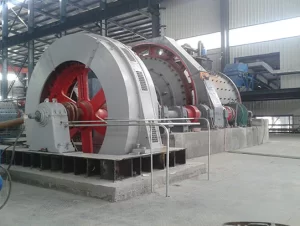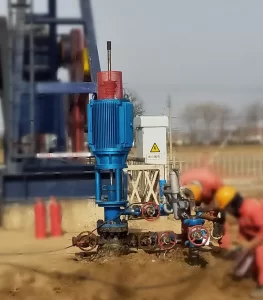
They are essentially electric motors where the focus of a torque motor is to get high starting torque while keeping the operating speed low. This is distinctly important in heavy equipment as it can operate under harsh conditions. Torque motors may not sound like something out of the ordinary, but they are a very important type of motor in heavy machinery and other applications that need high torque input without necessarily high rpm; for example, an electric car needs huge amounts of torque at low speeds initially to be able to move.
Torque motors are well known because of their high torque at low speeds, and are heavily used in applications for where precision and the power they provide can not be maximized. It is everywhere. From cranes, and excavators to drilling rigs, these motors are also instrumental to productivity because the best motor drive performs efficiently and stably throughout an extensive temperature range. In addition to this, the reliability and durability of torque motors aid in reducing operational downtime and maintenance costs, both of which are important for any business that relies on heavy machinery.
Torque motors have specific torque delivery characteristics and are different from conventional motors. These include their ability to produce high torque, low inertia, and ability to provide continuous torque throughout a wide range of speeds. Most torque motors are direct drive, meaning there is no need for additional gears or transmissions and most do not require maintenance and have improved reliability. Variable speed capabilities take their performance to new levels and also the tools you need to adapt as operational demands become harder rapidly.
Using torque motors within heavy machinery for equipment accomplishes greater performance and more efficiency. These motors are designed for high efficiency over a wide load range, providing good energy consumption. Permanent magnet synchronous motors (also known as a type of torque motor, where the load is on the same axis) demonstrate excellent efficiencies at low rates of loads. This is especially important in heavy industry applications as the consumption of power can have a great effect on operating costs.
Torque motors are well suited to applications with stringent speed control and positioning precision. Their design enables a smooth transition when speeding up and slowing down, which is crucial for heavy machinery that needs to lift or otherwise transport heavy loads. This feature helps in having control over the speed for preventing accidents and enhances operational safety.
Selecting a motor for heavy machinery involves some optimal considerations, and durability is at the top of the list; this is where torque motors shine. Torque motors take advantage of the reduced number of moving parts compared to traditional mechanical environments utilizing gears for power transmission, providing increased reliability and decreased service requirements. Because of their unique design, they can survive even the most severe conditions in an industrial environment with minimal impact on performance, resulting in long operational life and lower lifecycle costs.

The torque motors are widely used in cranes and hoists, where high starting torque is required to lift heavy loads safely and efficiently. This is extremely useful during the early stages of lifting, where having a lot of torque available at low speed means that you can move more carefully. Because of their efficiencies, torque motors save energy costs and therefore make cranes or hoists more economical.
Torque motors also improve the performance of torque applications in excavators and loaders by helping with the digging as well as maneuvering operations. These motors supply the power needed to start motion and perform challenging operations with minimum fuel consumption, thus maximizing productivity. Torque motors give this kind of control, allowing operators to perform delicate tasks more easily and increasing the usefulness of machinery at an on-site level.
Torque motors drive conveyor systems in material handling systems (efficient). Automated storage and retrieval systems. They have high torque abilities to help move materials quickly and accurately, which is a big part of any warehouse or manufacturing environment. These are able to adjust changes in load, guaranteeing stable work without the chance of jams or breakdowns.
Due to these factors, torque motors are highly advantageous for lift trucks and AGVs because of their design reliability and high efficiency. They often need to start and stop quickly while loaded, so the high-torque output of these motors is a must. Torque motors are also increasingly compact, allowing for even more efficient use of space in these vehicles can give a unique design and functional edge to manufacturers alike.
Drilling rigs use a load and high-pressure motor of the mining equipment. Torque motors are perfectly fit for this kind of application where high torques are required to be provided, along same torque in a continuous manner. Torque motors drive efficiencies and reliability, reducing downtime during drilling so that the overall operation can flow faster with fewer disruptions, increasing productivity over time while extending the lifespan of the equipment and completing jobs within prescribed windows.
In the same way, hauling systems in mining deployments use torque motors to proactively control heavy loads. By providing constant torque throughout their entire operation, they help reduce equipment wear and increase durability. These motors provide improved control and precision, which is not only efficiency-enhancing but also replace-safe in harsh mining conditions.

Qingdao Enneng Motor Co., Ltd focuses on developing and manufacturing electric motors such as torque motors. Leveraging years of industry experience, the company understands the different needs and challenges heavy machinery operators face. These years of experience, in turn, have enabled them to come up with novel ideas and manufacture quality torque motors for almost all industrial uses.
Its constant evolution is mainly a result of the company’s commitment to research and development, keeping it ahead of the curve in terms of technological advancements in motor design and manufacturing. By investing in technology and manpower, Qingdao Enneng has established itself as a reliable torque motor manufacturer for your needs. A fusion of time-tested engineering with current-day breakthroughs, their products represent what the industry wants today — and tomorrow.
Qingdao Enneng Torque Motors Manufacturers provides you with different kinds of torque motors to match up all the needs of heavy machinery. The portfolio of permanent magnet synchronous motors]is particularly designed for the most demanding efficiency and reliability requirements in every area of application. They are potentially well-suited for various heavy-duty operations as they can tolerate considerable load variations while delivering higher power factor and efficiency.
Also, the company provides bespoke motor solutions tailored for particular usages like air compressors and cranes, etc. that demand precise motion control in different machinery. With the capabilities to alter existing designs or create completely new products, customers can be assured that they will receive motors specific to their operational needs. International standards have further strengthened the company’s commitment to quality management and various certifications have proven its excellence in manufacturing.
The incorporation of advanced manufacturing processes and customer specification consideration make Qingdao Enneng one of the prominent torque motors for heavy machinery businesses. The performance enhancement products and operational efficiency derived from using their solutions lead to better returns on the investments made in heavy machine systems.